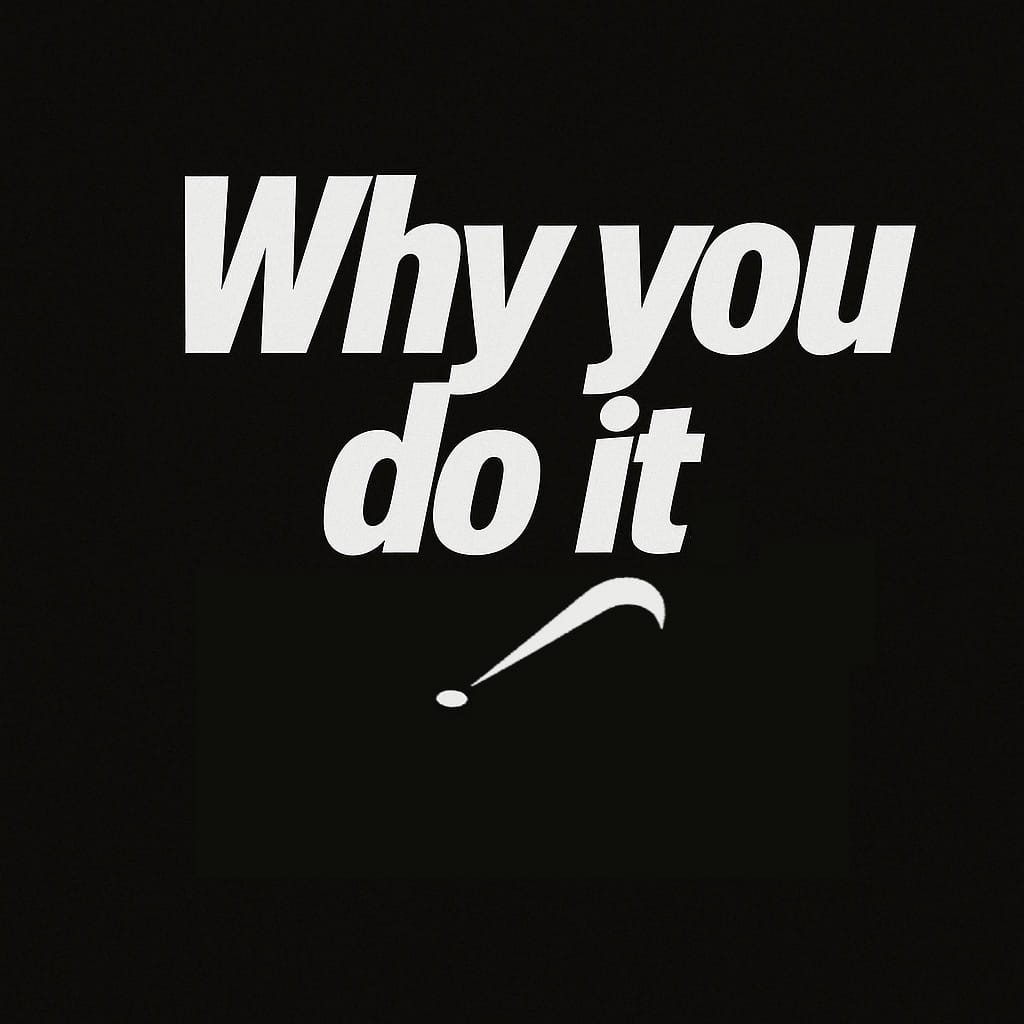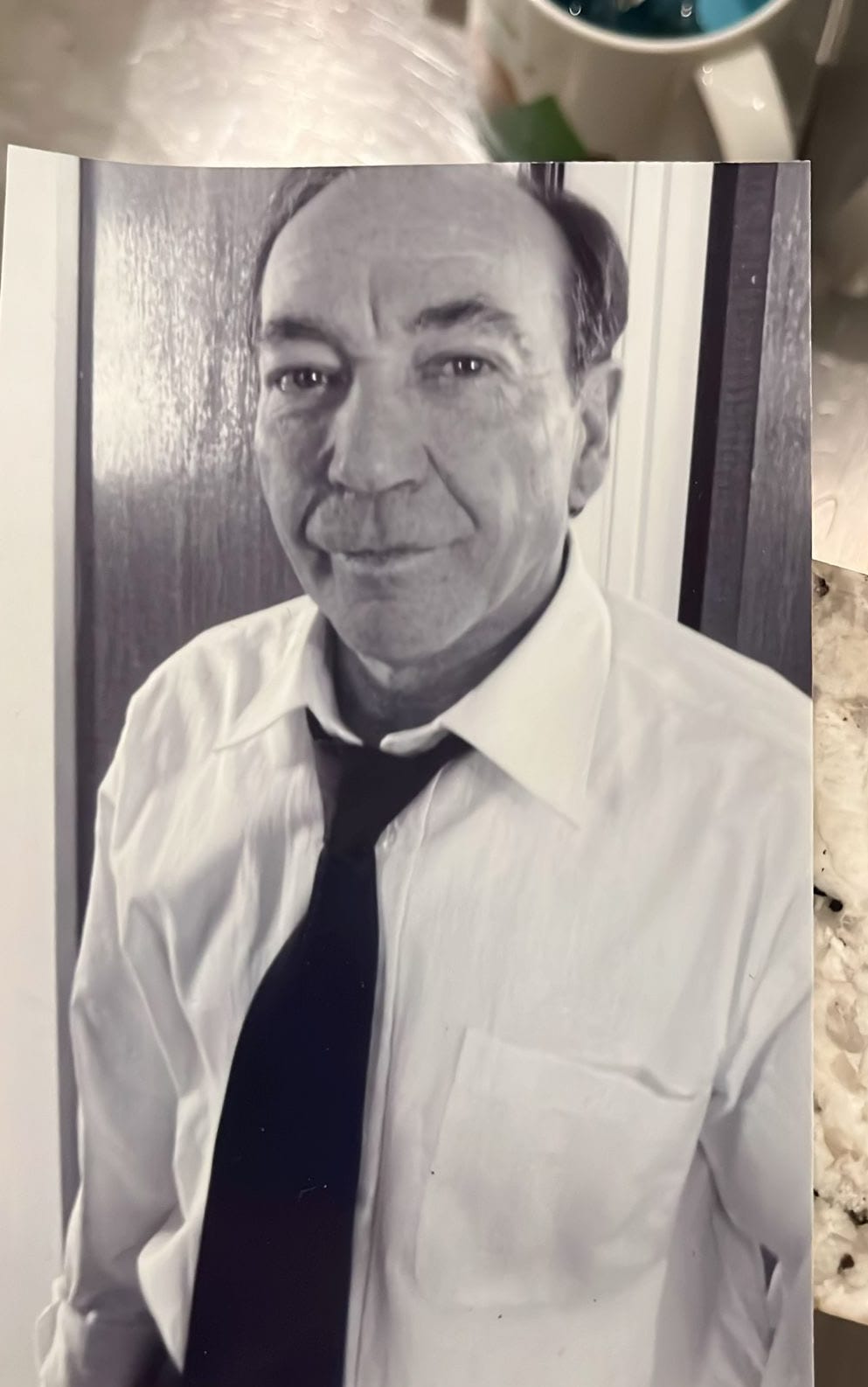Why You Do It: The Four Words That Changed How I Make Every Decision
A simple, four-word question my father used to ask changed how I make decisions. In this story, I explore how “Why you do it?” became the compass for living, and choosing, with intention.

For my regular readers, you know that I love exploring the tools and mental models that help us navigate life's decisions, especially those from ancient favorites like Plato and Socrates. But today, I want to talk about one of the wisest of them all, who, in my humble opinion, was someone much closer to home: my dad. I want to share a small, personal story, a lesson that came directly from him.
Sadly, he passed away recently, but one of his most enduring legacies is a simple question he'd ask me. It didn't matter if I was a kid getting into trouble or an adult wrestling with a dilemma. He'd look at me and ask, with his broken English speech and a heavy Italian accent, "Why you do it?"
Just those four words. And they've never left me.
Now, whenever I'm faced with a tricky decision or feel myself spinning my wheels, I hear his voice. It forces me to pause. Before I act, I ask myself, "Ed, once it's done, why did you do it? Or why are you doing this?"
I sit with my answer, holding it up to the light of those four wise words. Is my reason aligned with my values? Is it necessary? Or am I acting out of habit, pressure, or some other unexamined impulse?
Over time, that simple question has become more than a memory. It's a mental tool.
Slowing Down to Ask "Why"
In Thinking, Fast and Slow, Daniel Kahneman explains the two systems of thought: the fast, automatic one and the slow, deliberate one. My father's question—"Why do you do it?"—prompts me from the first system into the second.
When we rush through the day, reacting, checking boxes, and multitasking, it's easy to confuse busyness with progress. But stopping to ask "why" slows us down just enough to engage with intent. It's a reset, a pause, a redirect toward something more meaningful.
That makes this question powerful; it isn't complicated but clarifying.
This is why I apply the question to my larger projects. Before I start, I ask, 'Why am I doing this?' to define a solid goal. I then use the answer to set my milestones, ensuring my daily actions are drivers that naturally follow from that core purpose.
When the Question Saved Me
When I was fifteen, my dad caught me after I'd taken a puff of a friend's cigarette. He didn't yell. He didn't lecture. He just looked at me and asked: "Why you do it?"
I froze because I had no answer.
Not "I was curious." Not "I wanted to fit in." Just… nothing. A blank space where a reason should have been. And in that silence, I realized how stupid it was. I didn't even like it, it made me feel sick. So why had I done it?
That question didn't just stop me from smoking again. It planted something more profound: the understanding that I could do things, possibly harmful things, without ever asking myself why. That scared me more than my father's disappointment.
I still wonder: if he hadn't made me face that question, would I have kept going? Would I have built a habit I couldn't break, all because I never paused to ask why?
Applying the Question to Career Choices
Let's turn to something more tangible: your career. Imagine you're offered a promotion with a significant pay raise, but it would mean longer hours and more stress.
The automatic, fast-thinking response is to say yes. It's a promotion! More money! Status!
But then you hear the echo of the question: "Why do you do it?"
You sit with it. Is your "why" a genuine desire for the new challenges and responsibilities? Or is it a fear of disappointing your boss, or an assumption that "this is just what you're supposed to do"?
Maybe the answer is, "I'm doing it for the financial security for my family." That's a strong, value-driven why. But perhaps the answer is, "I'm doing it because I'd feel like a failure if I said no." That's a weak why, built on fear and external validation.
This question doesn't give you the answer but forces a clarity that simple pros-and-cons lists can't. It filters out the noise of expectations so you can hear the signal of your own intention.
Let Your 'Why' Be Your Compass
The power of "Why do you do it?" isn't just stopping a bad decision but pointing you toward good ones. But to do that, it needs a direction. It needs to know what matters to you.
For me, this question is the check-in. It's the moment I measure my actions against what I truly care about; things like integrity, kindness, and creating lasting things. If my "why" feels misaligned with those core values, I know I'm off course.
But what if you're still figuring out what you value? That's more than okay. In fact, that's the entire point. Asking "Why do you do it?" is how you discover your compass. Every time you pause to answer it honestly, you learn a little more about what drives you versus what you think should drive you.
The cigarette incident wasn't just about smoking; it was a lesson in peer pressure versus self-respect. A stressful work project becomes a question of ambition versus burnout. Whether strong or weak, each answer adds a data point, slowly drawing the map of who you are and who you want to be.
So you don't need the whole map drawn to start. You need to keep asking the question. Every time you ask, "Why do you do it?" you take one more step toward your chosen direction.
Bringing It All Together

We often search for the "next" complex framework or life-changing app, believing the answer must be something new. But the most powerful tools are usually the simplest, and sometimes, passed down with love.
I don't have a complex system to sell you. I just have my father's question. It's the one that pulled a 15-year-old boy back from a pointless puff of smoke and now guides a grown man through life and work.
It's a question asked with devotion, challenge, and a heavy Italian accent that I still hear.
So the next time you feel the pull of impulse, the weight of expectation, or the fog of indecision, you don't need to look for a new solution. Just pause, and ask yourself the same question my father asked me, complete with his Italian accent:
"Why you do it?" (Feel free to include the hand gestures, they're mandatory in my family.)
Then wait for the honest answer. That's where you'll find your way forward.
Stay curious. Stay honest. And always ask yourself why you do it.
If you like deep dives into creative chaos, productivity under pressure, and nerdy lessons from real-life experiments, subscribe to get future posts delivered right to your inbox. Subscribe Now